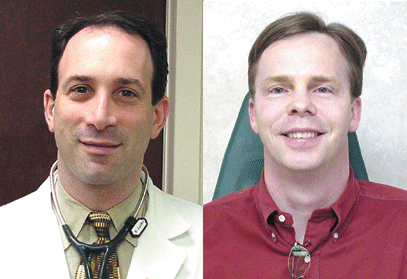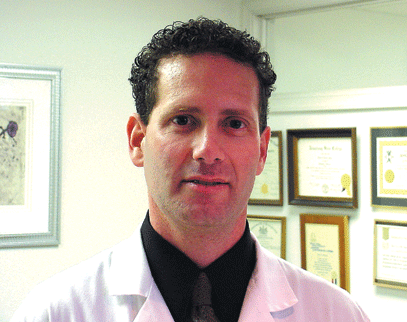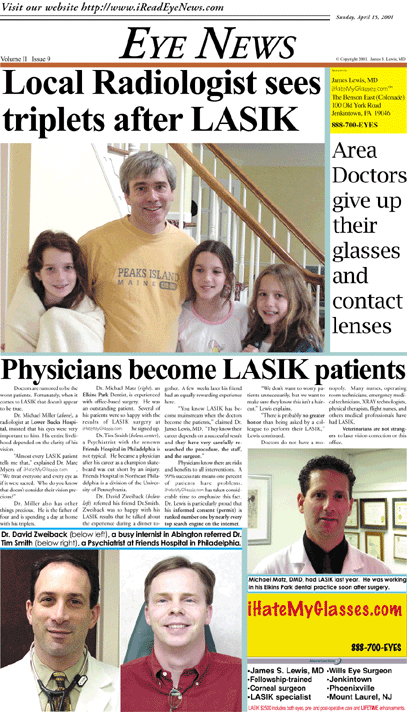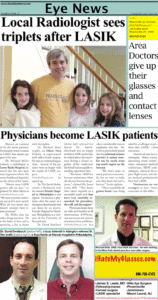Philadelphia / Bucks County LASIK Surgeon – Dr. James S. Lewis
Eye News Volume II Issue 9

Volume II Issue 9
Originally published, Sunday, April 15, 2001
Local Radiologist sees triplets after LASIK

Physicians become LASIK patients
Doctors are rumored to be the worst patients. Fortunately, when it comes to LASIK that doesn’t appear to be true.
Dr. Michael Miller (above), a radiologist at Lower Bucks Hospital, insisted that his eyes were very important to him. His entire livelihood depended on the clarity of his vision.
“Almost every LASIK patient tells me that,” explained Dr. Marc Myers of iHateMyGlassis.com. “We treat everyone and every eye as if it were sacred. Who do you know that doesn’t consider their vision precious?”
Dr. Miller also has other things precious. He is the father of four and is spending a day at home with his triplets.
Dr. Michael Matz (right), an Elkins Park Dentist, is experienced with office-based surgery. He was an outstanding patient. Several of his patients were so happy with the results of LASIK surgery at iHateMyGlassis.com he signed up.
Dr. Tim Smith (below, center), a Psychiatrist with the renown Friends Hospital in Philadelphia is not typical. He became a physician after his career as a champion skateboarder was cut short by an injury. Friends Hospital in Northeast Philadelphia is a division of the University of Pennsylvania.
Dr. David Zweiback (below left) referred his friend Dr. Smith. Zweiback was so happy with his LASIK results that he talked about the experience during a dinner together. A few weeks later his friend had an equally rewarding experience here.
“You know LASIK has become mainstream when the doctors become the patients,” claimed Dr. James Lewis, MD. “They know their career depends on a successful result and they have very carefully researched the procedure, the staff, and the surgeon.”
Physicians know there are risks and benefits to all interventions. A 99% success rate means one percent of patients have problems. iHateMyGlassis.com has taken considerable time to emphasize this fact. Dr. Lewis is particularly proud that his informed consent (permit) is ranked number one by nearly every top search engine on the Internet.
“We don’t want to worry patients unnecessarily, but we want to make sure they know this isn’t a haircut,” Lewis explains.
“There is probably no greater honor than being asked by a colleague to perform their LASIK,” Lewis continued.
Doctors do not have a monopoly. Many nurses, operating room technicians, emergency medical technicians, XRAY technologists, physical therapists, flight nurses, and others medical professionals have had LASIK.
Veterinarians are not strangers to laser vision correction or this office.
Dr. Michael Miller (above), a radiologist at Lower Bucks Hospital, insisted that his eyes were very important to him. His entire livelihood depended on the clarity of his vision.
“Almost every LASIK patient tells me that,” explained Dr. Marc Myers of iHateMyGlassis.com. “We treat everyone and every eye as if it were sacred. Who do you know that doesn’t consider their vision precious?”
Dr. Miller also has other things precious. He is the father of four and is spending a day at home with his triplets.
Dr. Michael Matz (right), an Elkins Park Dentist, is experienced with office-based surgery. He was an outstanding patient. Several of his patients were so happy with the results of LASIK surgery at iHateMyGlassis.com he signed up.
Dr. Tim Smith (below, center), a Psychiatrist with the renown Friends Hospital in Philadelphia is not typical. He became a physician after his career as a champion skateboarder was cut short by an injury. Friends Hospital in Northeast Philadelphia is a division of the University of Pennsylvania.
Dr. David Zweiback (below left) referred his friend Dr. Smith. Zweiback was so happy with his LASIK results that he talked about the experience during a dinner together. A few weeks later his friend had an equally rewarding experience here.
“You know LASIK has become mainstream when the doctors become the patients,” claimed Dr. James Lewis, MD. “They know their career depends on a successful result and they have very carefully researched the procedure, the staff, and the surgeon.”
Physicians know there are risks and benefits to all interventions. A 99% success rate means one percent of patients have problems. iHateMyGlassis.com has taken considerable time to emphasize this fact. Dr. Lewis is particularly proud that his informed consent (permit) is ranked number one by nearly every top search engine on the Internet.
“We don’t want to worry patients unnecessarily, but we want to make sure they know this isn’t a haircut,” Lewis explains.
“There is probably no greater honor than being asked by a colleague to perform their LASIK,” Lewis continued.
Doctors do not have a monopoly. Many nurses, operating room technicians, emergency medical technicians, XRAY technologists, physical therapists, flight nurses, and others medical professionals have had LASIK.
Veterinarians are not strangers to laser vision correction or this office.
Area Doctors give up their glasses and contact lenses

Dr. David Zweiback (left), a busy Internist in Abington referred Dr. Tim Smith (right), a Psychiatrist at Friends Hospital in Philadelphia.

Michael Matz, DMD, had LASIK last year. He was working in his Elkins Park dental practice soon after surgery.

Dr. Lewis conducts thorough consultations with all of his patients in order to recommend the most suitable vision correction treatments. While many individuals benefit from undergoing LASIK in Philadelphia, this procedure is not for everyone. For example, patients with thin corneas often can achieve better results through Epi-LASIK in Philadelphia. For those who do not qualify for any type of laser eye surgery, Dr. Lewis offers implantation of permanent contact lenses. In fact, he is regarded as one of the most experienced ICL Philadelphia / Bucks County specialists.

